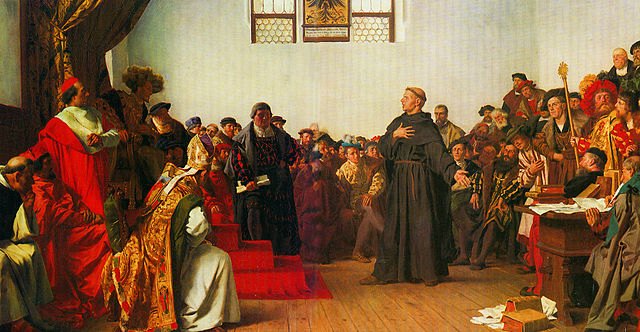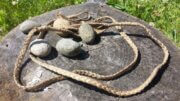Bryan Fischer
Martin Luther was the greatest man of the second millennium.
Many great and influential men moved about the world stage between 1000 AD and 2000 AD – George Washington, Thomas Jefferson, Napoleon, Abraham Lincoln, Bismarck, and Winston Churchill to name just a few – but Luther towers above them all.
As a lowly monk, he stood alone against the mightiest political power of the day, the emperor of the Holy Roman Empire, and against the mightiest religious power of the day, the pope of the Roman Catholic Church. This wasn’t David against Goliath, this was David against an army of Goliaths. Luther took them on, and he won.
As a result, the history of the world was changed forever, and the impact of his courage and boldness will be felt until the end of time.
Great men have left their imprint on the world’s politics, science, literature, art, commerce, and education. But over the last 500 years, all of them have stood on the shoulders of this great man.
While others brought civilization back to liberty or prosperity or peace, Luther brought civilization back to the word of God.
Luther had no intention of changing the world when he tacked the 95 Theses on the door of the Wittenberg Church on October 31, 1517. In fact, he said later that if he had known what he was getting into, he couldn’t have been dragged into it “by a team of twenty horses.”
But when he ran across John Tetzel corrupting the purity of the gospel beyond recognition by selling indulgences – sentence reductions in purgatory – for filthy lucre, had knew he had to do something.
He simply wanted to start a dialogue and a debate about the corruption and theological error that had crept into the church of his day. He had no desire to destroy the church; he only wanted to reform it. He wanted to restore the gospel in all its purity – that Scripture and not tradition is our ultimate authority, and that man is not saved by works but entirely by the grace of God through faith in Christ.

Luther Before the Diet of Worms by Anton von Werner (1843–1915).
But he was resisted, intimidated, and threatened by the religious and political establishment of his day, and brought before the Diet of Worms to answer to the emperor and the pope.
Luther manfully refused to budge even though he knew his life was at stake. Said Luther at the climactic moment, “Unless I am convicted by Scripture and plain reason…my conscience is captive to the Word of God. I cannot and will not recant anything, for to go against conscience is neither right nor safe. Here I stand, I can do no other, so help me God. Amen.”
An eyewitness reported that as he left the room after defying the most powerful men in the world, he raised his fist in the air and said, “I am finished!”
But he wasn’t. With God protecting him, he worked to bring European civilization back to the original authority of the Bible and away from misguided human tradition. He wanted to restore men to the glorious truth that they are set right with God by faith, and not by obedience to a set of man-made rules.
Protestantism was the fruit of his labor, and as it swept through Europe it not only revitalized a continent’s spiritual life, it radically reformed its political life as well. The biblical concept that every man is a priest in his own right led inevitably to the selection of political leaders by the vote of the people rather than by heredity.
Protestantism took root in England, but the hunger of the Puritans and Separatists for an even more purified church led them and hundreds of thousands of Protestants after them to the shores of America. (The population of America at the time of the Founding was 98.4% Protestant, 1.4% Catholic, and 0.2% Jewish).
The Protestant heirs of Luther in America formed the colonies, drafted the Declaration of Independence, crafted the Constitution, and unleashed the Protestant work ethic which made America the most prosperous nation in the history of the world. Protestants founded America and built America.
America soon became the greatest force for good in the history of humanity, modeling what a republican form of government looks like, demonstrating the centrality of Christianity to a prosperous and stable society, and sending more missionaries to more darkened corners of the world than the rest of the world combined.
In 1851, the yacht “America” took on the sailing world and trounced the competition. Queen Victoria asked, “Who is first?” When she was told it was America, she asked, “Who is second?” “There is no second,” came the reply.
And none of that would have been possible apart from the courage of one man who dared to stand on the truth of Scripture and change the course of human history.
The greatest man of his millennium? Hands down, Martin Luther. And there is no second.
(Unless otherwise noted, the opinions expressed are the author’s and do not necessarily reflect the views of the American Family Association or American Family Radio.)
Twitter: @BryanJFischer, on Facebook at “Focal Point”
Host of “Focal Point” on American Family Radio, 1-3pm CT, M-F www.afr.net




